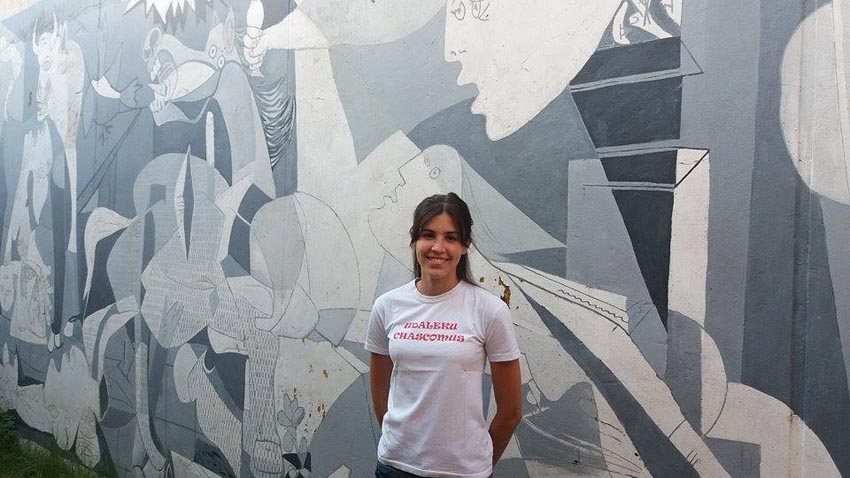Joseba Etxarri. Her great-grandparents came during the 1930s from Pamplona to Chascomus, in the province of Buenos Aries where a large part of the Basque community is from Nafarroa and Behe Nafarroa, including the family Alfonsin-Barrenechea of who was president of the Republic and whose spouse if from Erratzu-Etxebeltza, in Baztan. Zingirako Euskaldunak is the name of the Basque club in Chascomus and Paula Berasain is a member. As Udaleku 2016 coordinator she took over from Maria Laura Eguren. In fact Paula has no doubt that Udaleku is an important activity that works the quarry and the future of these children who will one day be in responsible positions at their Basque clubs, or Argentine citizens that cultivate and support their culture anywhere they are..
Six years ago you attended Udaleku as a child, the first one in Chascomus. Today at the age of 22 you are coordinating it.
-That’s how it went, don’t forget that this is the result of team work that everyone is involved in. In 2014, because of economic reasons, we weren’t able to carry it out. This year we have rejuvenated the teach and we have divided up the work, with Anita Etchepare, and Celeste Bona being in charge of games; Catalina Arraras, Lucia Marruedo and Federico Redin, in charge of instructors; Sebastian Errecart, Graciela Basterra and Graciela Laborde, the kitchen crew; and Maria Laura Eguren and Maitena Etchepare as administrators as well as other tasks. We were lucky enough to have an instructor from Donostia, Eneko Lizarra who participated in the first Udaleku, who arranged to be here and help us.
What were the economic problems that you mentioned?
-A serious problem that afflicts us in Argentina is that the distances can be huge and the Basque clubs are really far apart which means that for many clubs it is very expensive to send children to Udaleku. This is aggravated if there are more than one child in a family that want to participate. Parents can’t assume this expense and so it needs to be subsidized in some way. It is also true that we have to convince some Basque clubs that it is worth the investment in this age group. The results are there; on the last day, nobody wanted to go home and everyone wants to do this again next year.
How did you start to interact with Basque?
-Chascomus is a city with a big Basque influence and the Basque community is probably the most active and well-known. They established the first Basque club in 1952, but previously there were other entities founded by Basques, and a large number of Basques have notably contributed to the development of the area. In regards to sports, the Pelota Club, with a fronton is an imposing Basque-style building that has been here since 1925. My great-grandparents came to this environment, even though to tell the truth, that part in my family was pretty lethargic until I started to get involved at the age of 12 or 13 as a club dantzari. I began because several friends had joined to practice dance and that encouraged me too. From there I became more and more involved and they asked me to take on more responsibility. I was an instructor, dance director and this year I coordinated Udaleku, even though now I’m studying at the College of Medical Sciences in La Plata so my time is limited.
How do you feel about Udaleku 2016…
-It was very successful and took place on January 5-9 with 22 participants from Cañuelas, Maipu and Chascomus. We begun organizing it a little bit behind and with no any funding but the parent's contributions; for some time we had the support of the Provincial Government of Gipuzkoa and it was great but not anymore. We may have had only a few participants but those who were here let us know that they were very happy and that encourages us and makes even more determined to keep going. We know that this is a very important activity, even though it was organized on a shoestring budget. During her time, Maria Laura Eguren made a proposal to FEVA that was never answered so we decided to go ahead with it as our own activity that we will continue to improve from year to year. Looking to next year, we are hoping to start organizing in June to be ready for January 2017, meeting with directors prior to Semana Vasca in Necochea and making our presence known online with a blog so we can keep people updated and easily communicate with people who are interested.
Why is Udaleku important?
-This is the only common activity that we have in Argentina for children and youth in this age group, between 12 and 16. It’s not only enjoyable, but also a time when participants affirm their connection to the Basque culture and being Basques. They have fun, make friends from other clubs, learn songs, and about Basque culture, food, sports and dance…it is our quarry. We like the Hator Hona model in Necochea and we would like to have direct contact with children and youth from the Basque Country, and maybe get some training there. Connections and having direct relation with youth in the Basque Country are important for us. My email is: Udalekuchascomus@hotmail.com and I would love to hear from people with comments and proposals.






 Send to a friend
Send to a friend Add comment
Add comment








